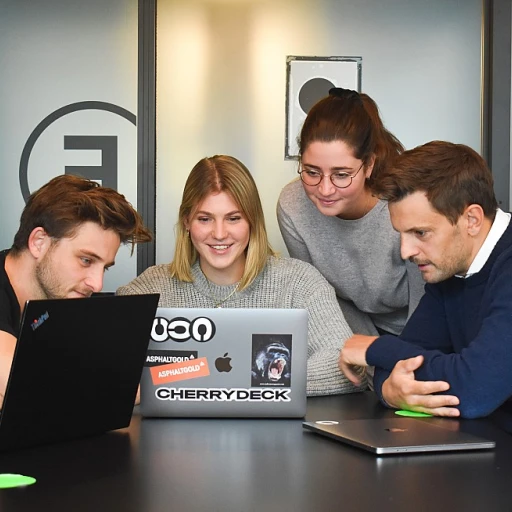
Understanding Peer-to-Peer Interviews
Diving into Peer-to-Peer Interviews
In today's dynamic hiring landscape, introducing peer-to-peer interviews into the recruitment process can significantly enrich the overall candidate experience. A peer interview involves team members who will work directly with the candidate to assess various aspects such as technical skills, problem-solving abilities, and cultural fit. This approach connects the candidate with the company's team culture and provides valuable insights into team dynamics. Peer interviews hold particular importance as they allow potential employees to interact with existing staff, offering them a genuine sense of the work environment. This process not only gauges their fit within the team but also helps both the company and the candidate in assessing how the latter's skills and personality would complement the existing team members. Peer participation in interviews helps in creating a comprehensive hiring process. Here, team members tobe working peers act as interviewers, bringing firsthand knowledge of the job requirements, company's culture, and everyday challenges candidates might face. By considering factors like emotional intelligence and communication skills, peer interview questions become instrumental in revealing a candidate's potential to fit the team efficiently. The essentials of 360-degree assessment questions play a crucial role in understanding how fellow team members perceive candidate competence across different areas. Enhancing the peer interview framework with well-thought-out questions ensures candidates exhibit not only strong technical skills but also the soft skills crucial for team success. As the interview process unfolds, it holds the promise of a well-rounded and insightful evaluation for both candidates and the hiring team alike.Key Benefits for Candidate Experience
Enhancing Candidate Experience through Peer Interviews
Peer-to-peer interviews have become an increasingly valuable component of the hiring process, contributing positively to the overall candidate experience. Incorporating team members into the interview process presents numerous benefits, both for the candidates and the company. Understanding these advantages can help refine your hiring process and improve candidate satisfaction. First and foremost, peer interviews provide candidates with a more comprehensive view of the company culture and team dynamics. By interacting with potential future colleagues, candidates gain insights into the daily work environment and the soft skills valued within the team. This direct interaction helps assess cultural fit more accurately than traditional interview stages. Furthermore, involving peers in the interview process emphasizes transparency and open communication. Candidates appreciate an interview process that allows them to meet individuals they might work with, which in turn helps them better understand the expectations and challenges associated with the role. Peer interviews also present an opportunity to evaluate problem-solving and technical skills in a real-world context. By tailoring questions to reflect team-specific scenarios, peer interviewers can ascertain a candidate’s ability to integrate with the team and address actual work challenges they will likely encounter. The involvement of peers provides diverse perspectives in evaluating candidates, contributing to a more rounded assessment. This collaborative approach can identify strengths and weaknesses that might be overlooked by a single interviewer. Peer feedback plays a crucial role in making informed hiring decisions that align with team goals and company culture. Lastly, from a candidate's point of view, peer interviews offer a more engaging and less intimidating experience. When candidates feel welcomed and understood by their potential peers, their skills and attributes are likely to shine through more effectively, leading to a mutually beneficial hiring outcome. For further insights on optimizing peer-to-peer interview questions, explore this comprehensive guide that delves into the essentials of crafting effective questions.Crafting the Right Questions
Designing Questions to Uncover Potential
Crafting effective peer-to-peer interview questions is vital to enriching the interview process. By focusing on specific areas such as soft skills, technical skills, and cultural fit, interviewers can hone in on a candidate's true potential. Here’s how to design questions that reveal the necessary attributes to fit your team dynamics and company culture. Firstly, assess the candidate's problem-solving abilities and technical skills. Questions should be structured to explore their past experiences and how they've leveraged their skills to tackle challenges. For instance, you may ask, "Can you describe a time when you utilized your problem-solving skills to address a difficult situation?" This not only highlights the candidate’s technical prowess but also their approach to unexpected hurdles. Soft skills are equally important in determining a candidate’s fit within a team. Peer interview questions that focus on communication and emotional intelligence can illustrate a candidate’s ability to engage positively with others. An example question might be, "How do you ensure effective communication when working with team members with differing viewpoints?" Such questions elicit responses that showcase how candidates collaborate and adapt their communication style in various scenarios. Understanding the company culture is crucial, especially in positions that require teamwork. Designing questions that reflect the team’s culture is key. Inquire about situations where the candidate had to adapt to a new team environment, asking, "What strategies do you implement to assimilate into a new work environment and contribute to the team culture?" These responses help assess whether the candidate supports or enhances your team's existing culture. While crafting questions, it's essential to remember that interviews are a two-way street. Allow candidates to express their values and expectations concerning company culture and team dynamics, as this will help both parties gauge mutual compatibility. A good peer interview not only evaluates a candidate but also empowers them to ask insightful questions about your company, providing clarity on prospective team interactions and expectations. For further information on essential questions and their impact on interviews, you can visit essential questions for effective skip level meetings.Training Peers for Interviews
Equipping Team Members to Conduct Peer Interviews
Training peers for interviews is a pivotal part of the hiring process, especially when aiming to enhance the candidate experience. This process ensures that team members conducting peer interviews are well-prepared, thereby creating a more consistent and efficient interview process. With effective training, peers are better equipped to assess candidates' fit for the team and the overall company culture. Peer interviewers must acquire a clear understanding of the various aspects to be evaluated during interviews. Here's a breakdown of key factors to consider:- Understanding Team Dynamics and Roles: Encourage peers to gain insights into the roles they're hiring for. Peers should be acquainted with the required technical skills and the everyday tasks within the prospective work environment.
- Developing Emotional and Cultural Intelligence: It's crucial to assess candidates' soft skills alongside their technical capabilities. Thus, peer interviewers should be trained to recognize signs of cultural fit and emotional intelligence during interviews.
- Communication Skills: Effective communication is vital. Training sessions should focus on helping peers formulate and pose questions clearly and interpret candidates' answers accurately.
Common Mistakes to Avoid
Common Pitfalls in Peer Interviews
Peer interviews can be a powerful tool in the hiring process, offering insights into how a candidate might fit into the team dynamics and company culture. However, there are several common mistakes that companies often make, which can undermine the effectiveness of these interviews.
- Lack of Training for Peer Interviewers: One of the most frequent mistakes is not adequately training team members who will conduct the interviews. Without proper guidance, peer interviewers might struggle to assess a candidate's technical skills or soft skills effectively, leading to inconsistent feedback.
- Overemphasis on Technical Skills: While technical skills are crucial, focusing solely on them can lead to overlooking a candidate's emotional intelligence and cultural fit. It is essential to balance the questions to evaluate both hard and soft skills.
- Poorly Crafted Questions: Crafting questions that are too generic or irrelevant can fail to uncover the candidate's ability to work within the team. Tailoring questions to assess specific competencies and team culture is vital.
- Inconsistent Interview Process: Variability in the interview process can lead to confusion and unfair assessments. Establishing a standardized process helps ensure each candidate is evaluated on the same criteria.
- Ignoring Feedback: Feedback from both candidates and peer interviewers is invaluable. Ignoring this feedback can lead to repeated mistakes and a poor candidate experience. Regularly evaluating feedback and improving the process is crucial for success.
By addressing these common pitfalls, companies can enhance the effectiveness of peer interviews, ultimately leading to better hiring decisions and a more positive candidate experience.
Evaluating Feedback and Improving Processes
Gathering and Utilizing Constructive Feedback
Once peer interviews have been conducted, a vital step in the hiring process is gathering and leveraging feedback to enhance future interviews. Understanding how team members perceive a candidate's communication skills, cultural fit, and technical capabilities can be invaluable for refining the interview process.
Effective feedback collection should focus on several key areas:
- Consistency in Evaluations: Ensure that feedback from different peer interviewers reflects a balanced assessment. It’s important that evaluations remain consistent to assess candidates fairly.
- Alignment with Company Goals: Evaluate how candidates align with the company culture and team dynamics. This criterion helps to filter candidates who will fit well within the team and contribute positively to the work environment.
- Detail-Oriented Feedback: Peers should be trained to provide insightful feedback, focusing on specific aspects such as problem-solving abilities, emotional intelligence, and adaptability.
Once feedback is gathered, it should be analyzed to pinpoint common themes or areas for improvement in the interview questions. This will help enhance the candidate experience by ensuring each interview is crafted to accurately assess the right skills and traits. Encouraging open communication among peers about their interview experiences can also lead to valuable insights.
Avoiding common mistakes and focusing on continuous improvement will assist in developing a robust hiring process. This approach not only benefits the company by selecting the right candidates but also builds a more effective team that aligns with company objectives.













